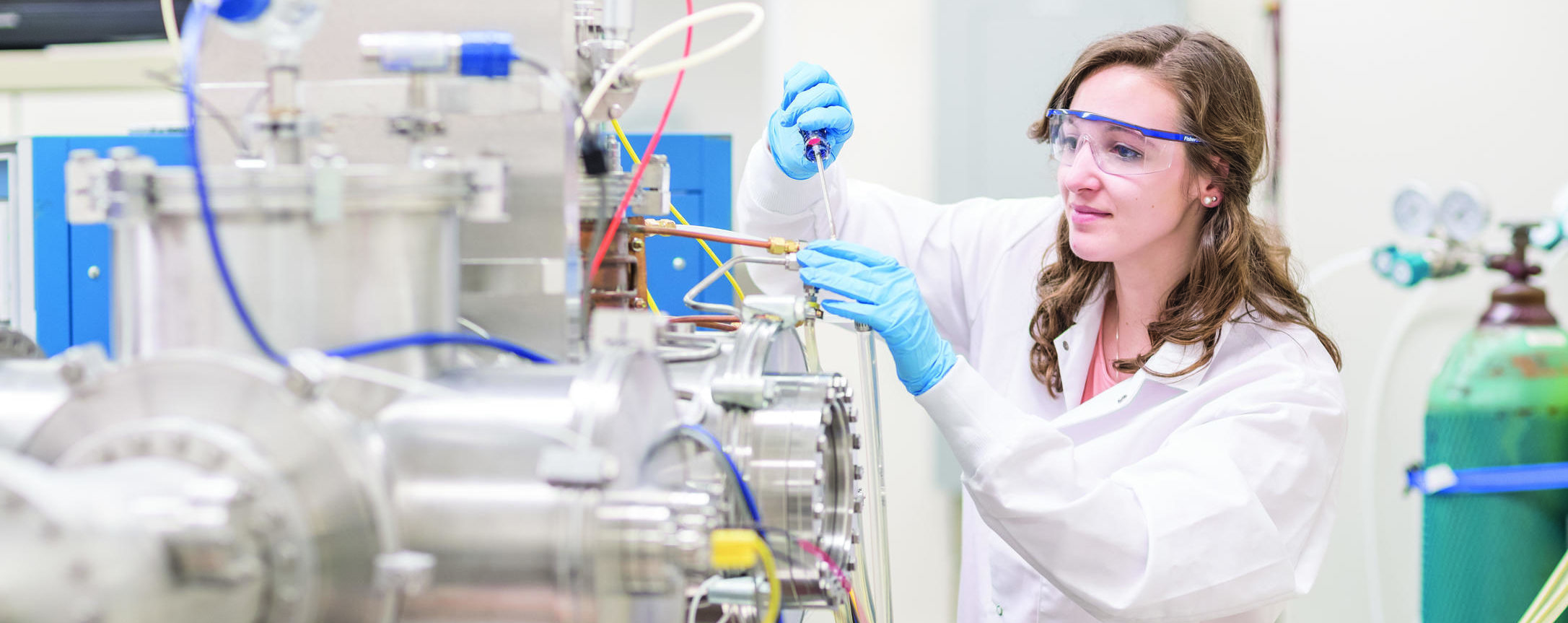A new initiative focused on recruiting interdisciplinary clusters to address some of the most pressing challenges and exciting opportunities of our times.
What is the Cluster Hire Initiative?
Through It Takes a Volunteer, the University of Tennessee, Knoxville (UT) is committing $50 million over five years for a cluster hire initiative that will recruit top-tier faculty members across multiple disciplines.
Our faculty community is a critical driver of progress toward realizing UT’s ambitious Strategic Vision. The cluster hiring process enables faculty-led excellence in transdisciplinary research and teaching through a significant commitment of institutional resources.
Putting the Power of UT to Work
UT is at the forefront of cutting-edge research, and our aim is to focus this work on solving society’s grand challenges felt in Tennessee and beyond, to make life and lives better. As a major research institution, UT must tackle these challenges by bringing together a diversity of thought and of disciplines.
To empower this approach, the seven clusters will add additional faculty talent to institutional areas of excellence where UT already has depth of expertise across disciplines, to work together on solving specific problems with use-inspired outcomes. Cluster teams will build and lead innovative research programs with a potential for significant impact and develop promising new educational programs in high-demand areas.

—Chancellor Donde Plowman
Why Join a Cluster?
Participation in a cluster offers unique opportunities to leverage resources to build bold agendas that advance big ideas. New hires will join collaborators with shared research interests and a strong desire to grow the scholarly and educational impact of their work beyond what it is possible to accomplish as an individual. For early career faculty, the clusters also offer a unique framework for mentoring and professional development.
The ideal candidate for these positions has a collaborative mindset and prioritizes working with other members of their cluster to realize shared research and educational achievements, including large-scale proposals, joint publications, and new transdisciplinary curricular programming. As Tennessee’s flagship land-grant institution, UT is particularly interested in recruiting candidates who are deeply connected to the organizations and communities in which their work will have translational impact, as well as those who will contribute to a climate that values diversity and inclusion.
Clusters and Open Searches
- Hiring Colleges: UT Institute of Agriculture; College of Arts and Sciences; Tickle College of Engineering
- Cluster Lead: DeWayne Shoemaker
- Complementary Initiatives and Resources: AI Tennessee, OneHealth Initiative, Plant Research Center
In the face of changing environmental conditions and pest and disease pressures, scientists around the globe must develop, harness, and apply new technologies to address threats to global food security. This challenge requires interdisciplinary research supporting the sustainable intensification of agriculture to optimize productivity and land and resource use. One solution, and the overall thematic area of this cluster, is development of climate-resilient crops (often described as precision or digital agriculture). UT is poised to become a global leader in this area. Advances in genomics and computational methods in bioinformatics and machine learning offer potential solutions. However, relating data-driven solutions and gaining societal understanding and acceptance of new approaches remain huge challenges that require coordination of diverse skills and expertise. This cluster will integrate several disciplines and technologies to address this urgent need and make a marked impact.
- Hiring Colleges: UT Institute of Agriculture; Howard H. Baker Jr. Center for Public Policy; Tickle College of Engineering
- Cluster Lead: Jie Zhuang
- Complementary Initiatives and Resources: AI Tennessee
Open Positions:
- Associate Professor, Baker School of Public Policy / Institute of Agriculture
- Assistant Professor, Biosystems Engineering & Soil Science / Electrical Engineering & Computer Science
- Associate or Full Professor, Electrical Engineering & Computer Science / Biosystems Engineering & Soil Science
Innovative technologies such as telecommunications, artificial intelligence, advanced sensor technology, real-time aerial imaging and autonomous mechanical agricultural platforms are currently evolving at rapid rates. At the same time, expansion of policies and markets for ecosystem services are providing the financial certainty and know-how to hasten the diffusion of these technologies. By combining experimental data with data science at the intersection of agriculture, forestry, engineering and economics, this cluster aims to help farm and forestry enterprises adapt to climate change.
- Hiring Colleges: College of Education, Health, and Human Sciences; UT Institute of Agriculture; College of Nursing
- Cluster Lead: Hollie Raynor
- Complementary Initiatives and Resources: OneHealth Initiative, Cherokee Health Systems
Open Positions:
Despite food production advancements in the past half century, more than 820 million people still experience hunger and more than two billion people experience malnutrition worldwide. Tennesseans experience those issues at a higher rate than most Americans. For example, out of the 50 states Tennessee ranks 41st for food insecurity, 38th for obesity, and 46th for diabetes. The use of a sustainable food system framework is one recommended approach to address this challenge. This approach addresses all factors involved in the production, processing, distribution, preparation, consumption and disposal of food products as well as the broader economic, social and environmental factors. While other institutions have focused on specific components of a food system such as supply chain or consumer behavior, UT has strengths in all areas of a sustainable food system approach. This cluster will coordinate interdisciplinary expertise to focus on enhancing consumer food acquisition behaviors and improve diet quality, address health disparities associated with food and nutrition insecurity, and accelerate UT as a leader in food and nutrition security.
- Hiring Colleges: Tickle College of Engineering; College of Arts and Sciences
- Cluster Lead: Hairong Qi
- Complementary Initiatives and Resources: AI Tennessee, Bredesen Center for Interdisciplinary Research and Graduate Education
The ultimate goal of artificial intelligence is to build a machine that performs cognitive functions that are more associated with humans, such as thinking, learning, problem solving and reasoning. However, despite the remarkable success of the unfolding AI wave empowered by deep learning, current AI practices are in stark contrast to human intelligence. This cluster aims to develop AI solutions inspired by cognitive neuroscience with a strong focus on dynamic learning — a cornerstone of human intelligence. The cluster will enable a comprehensive investigation of learning dynamics from the developmental, functional, mathematical and implementation perspectives.
- Hiring Colleges: Tickle College of Engineering; College of Arts and Sciences; Haslam College of Business; Howard H. Baker Jr. Center for Public Policy
- Cluster Lead: Kevin Heaslip
- Complementary Initiatives and Resources: Center for Transportation Research, Institute for Future Mobility; AI Tennessee; Institute for Advanced Materials and Manufacturing
Open Positions:
- Full Professor, Electrical Engineering & Computer Science
- Assistant or Associate Professor, Mechanical Engineering
- Assistant Professor, Industrial & Systems Engineering
- Assistant Professor, Civil Engineering
As the automotive and transportation industries continue to undergo rapid technological change, there is a need to meet the heightened demand for advanced mobility research and development initiatives. This cluster will impact two major areas — the greening of transportation and the building of a green transportation economy that will drive economic growth for the state. Faculty will explore, invent and validate new technologies, processes, systems and services that are responsive to mobility consumer and industry needs; prepare a workforce to contribute to Tennessee’s mobility economy through education, reskilling and upskilling; and create shared research testbeds and facilities that support developing and deploying cutting-edge mobility solutions in real-world environments.
- Hiring Colleges: College of Nursing; Tickle College of Engineering; College of Communication and Information; College of Arts and Sciences; UT Institute of Agriculture, College of Veterinary Medicine
- Cluster Leads: Tami Wyatt and Chris Cox
- Complementary Initiatives and Resources: AI Tennessee; Center of Excellence in Livestock Diseases & Human Health; Genomics Center for the Advancement of Agriculture; National Institute for Mathematical and Biological Synthesis; One Health Initiative; UT Graduate School of Medicine
Open Positions:
The link between exposure to environmental conditions and human health has shown outcomes at multiple levels including vector-borne diseases, infectious diseases, cardiac conditions, respiratory conditions, mental health conditions and cancers. Among these, cardiac health, respiratory illnesses and cancer-related disorders are the top three health care problems across the state of Tennessee. Building on UT’s strengths in domain-specific data collection, analysis and modeling, and decision-making, this cluster will integrate campus expertise in community engagement and enhance UT’s capacity to study the connections between environment and human health and wellness through advanced data analytics and precision health.
- Hiring Colleges: College of Arts and Sciences; Tickle College of Engineering
- Cluster Lead: Vasileios Maroulas
- Complementary Initiatives and Resources: AI Tennessee; UT Institute for Advanced Materials and Manufacturing; UT–Oak Ridge Innovation Institute; UT Space Institute
Open Positions:
- Associate Professor or Full Professor, Physics Informed Machine Learning
- Associate Professor or Full Professor, Geometric Deep Learning
Tennessee is a growing high-tech hotbed with some of the most sophisticated manufacturing facilities in the world, particularly in the area of advanced materials and manufacturing. These intelligent engineering systems generate a rich library of complex data that persistently challenges the current state of the art in artificial intelligence. This cluster aims to develop foundational multiscale, multimodal models for artificial intelligence that respect the various physical laws and the chemical properties that govern the underlying process. Faculty will optimize scientific and mathematical AI for intelligent engineering systems, particularly for additive manufacturing and hypersonic defense systems.
Cluster Hire Initiatives Updates
Please visit the Cluster Hire Initiative Updates page for more details about the selection process.
